Trade Update (September 21)
Section 232
The Department of Commerce Bureau of Industry and Security (BIS) published an interim final rule regarding the Section 232 steel and aluminum exclusion process. The announcement requested that interested parties submit their comments by November 13, 2018. The new rule would modify the interim final rule published on March 19, 2018 by adding a rebuttal and subrebuttal process to the exclusion request process. Commerce aims to make the process more transparent, fair, and efficient.
Under the proposed rule, if a business has not yet received a final determination, they are able to submit a rebuttal to any objections to their exclusion request. The rebuttal period will last for 7 days after Commerce has posted the complete list of objections received on the exclusion request. After that period, objectors (the original business) will have 7 days to submit subrebuttals.
Section 301
On Monday (17 Sept), President Trump announced USTR will be levying 10% tariffs on an additional $200 billion worth of Chinese imports. The tariffs will take effect on Monday, September 24. On January 1, 2019, the tariffs will be increased to 25%. After the hearings in July and August, 286 full or partial lines were removed from the final tariff list.[i]
At this point, the US has levied tariffs on $250 billion worth of Chinese imports in response to their unfair trade practices and China has retaliated in kind. The proclamation stated, “If China takes retaliatory action against our farmers or other industries, we will immediately pursue phase three, which is tariffs on approximately $267 billion of additional imports.”
NAFTA
Canadian Trade Minister Freeland spent her fourth week in DC attempting to renegotiate NAFTA. She left on Thursday (20 Sept) without a finalized agreement. In addition to renegotiating NAFTA chapters, Canada is pressuring the US to exempt them from the Section 232 steel and aluminum tariffs. This comes as reporters stated the US wants to limit Canadian auto exports to the US to 1.7 million vehicles.[ii] Unlike Mexico and the US, Canada does not feel pressured to reach an agreement by September 30, which has frustrated the Trump administration and Republican members of Congress.[iii] Recently, high profile Republican members, such as Majority Whip Steve Scalise, have stated they would be willing to approve a bilateral US-Mexico trade agreement if the US and Canada cannot reach a trilateral NAFTA.[iv]
US business and labor groups have been strong advocates for including Canada in a renegotiated NAFTA. On Monday (17 Sept), The US Chamber of Commerce, the Business Roundtable, and the National Association of Manufacturers sent a letter to USTR Lighthizer saying, “it would be unacceptable to sideline Canada, our largest export market in the world […] We commend you for reaching an agreement in principle with Mexico that appears to include strong rules on intellectual property, digital trade, and financial services. We hope to see these apply to Canada in equal measure.”[v]
Next week the United Nations General Assembly meetings will take place in New York City. Trade Minister Freeland and USTR Lighthizer are both expected to attend, but there has been no formal announcement about the next round of NAFTA discussions.[vi]
Meeting on the Global Forum on Steel Excess Capacity
The world’s largest steel-producing nations met in Paris for the annual Meeting of the Global Forum on Steel Excess Capacity on Wednesday (20 Sept). The Forum was established in December 2016 by the G20 Leaders and includes 33 economies, many of whom are G20 members in addition to interested Organization for Economic Co-operation and Development (OECD) countries.
Deputy USTR Jeffrey Gerrish represented the US at the forum. In a statement, he questioned if the Forum was capable of “delivering on its objectives,” and stated the excess capacity will not be solved until “those that have created this problem act to remove subsidies and other measures that distort markets and create serious global imbalances.”[vii]
The EU’s Commissioner for Trade Cecilia Malmstrom took a more optimistic view and noted that the “global challenge of overcapacity has strained trade relations and the global trade architecture to its breaking point. Progress in this Forum at this sensitive time demonstrates that multilateral cooperation is not only possible, but that it is actually the best tool to tackle global challenges.”[viii]
Auto Tariff Hearing
Senator Orrin Hatch (R-UT) announced the Senate Finance Committee will hold a hearing to explore the effects of tariffs on customers, local communities, and the industry as a whole. The hearing will take place on Wednesday, September 26th at 10:30am and will be broadcast here. In the announcement, Senator Hatch said, ““For a typical American family, a car is the second biggest purchase they make. I look forward to hearing from our witnesses to learn more about the potential harm tariffs could have on the industry and how they may be passed along to consumers. This hearing will give Finance Committee members an opportunity to engage with experts on what new tariffs on automobiles and automotive parts could mean for families, job creators and U.S. economic growth.”[ix]
[i] USTR Finalizes Tariffs on $200 Billion of Chinese Imports in Response to China’s Unfair Trade Practices.” USTR, 18 Sept 2018. https://ustr.gov/about-us/policy-offices/press-office/press-releases/2018/september/ustr-finalizes-tariffs-200
[ii] David Ljunggren. “NAFTA deal not yet in sight, Canada stands firm on auto tariffs.” Reuters: Washington, 20 Sept 2018. https://www.reuters.com/article/us-usa-trade-china-walmart/walmart-warns-trump-tariffs-may-force-price-hikes-letter-idUSKCN1M100D
[iii] James McCarten. “Despite progress, threat of 232 tariffs dominates NAFTA negotiations.” Keremeos Review, The Canadian Press, 20 Sept 2018. https://www.keremeosreview.com/news/despite-progress-threat-of-232-tariffs-dominates-nafta-negotiations/
[iv] “Scalise tells Canada ime is running out to join NAFTA update.” Roll Call, 19 Sept 2018. https://www.rollcall.com/news/policy/scalise-tells-canada-time-running-join-nafta-update
[v] Daniel Dale. “Canadian government shrugs off Republicans’ pressure and criticism.” The Star: Washington, 19 Sept 2018. https://www.thestar.com/news/world/2018/09/19/us-buy-american-demand-gone-from-nafta-as-canada-mexico-claim-credit-sources-say.html
[vi] Associated Press. “No new progress reported in US-Canada trade talks.” The Business Times: Washington, 21 Sept 2018. https://www.businesstimes.com.sg/government-economy/no-new-progress-reported-in-us-canada-trade-talks
[vii] “USTR Statement on Meeting of the Global Forum on Steel Excess Capacity.” USTR: Paris, 20 Sept 2018. https://ustr.gov/about-us/policy-offices/press-office/press-releases/2018/september/ustr-statement-meeting-global
[viii] “Steel: Global Forum takes important steps to tackle overcapacity.” European Commission: Brussels, 21 Sept 2018. http://europa.eu/rapid/press-release_IP-18-5865_en.htm
[ix] “Hatch Announces Hearing on Impact of Tariffs on the U.S. Auto Industry.” US Senate Committee on Finance, Washington, 19 Sept 2018. https://www.finance.senate.gov/chairmans-news/hatch-announces-hearing-on-impact-of-tariffs-on-the-us-auto-industry-
HOUSE.GOV
The Week Ahead
For the main events of the next week and more, go straight to the key events on the house.gov website.
SENATE.GOV
The Week Ahead
For the main events of the next week and more, go straight to the key events on the senate.gov website.


